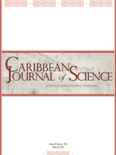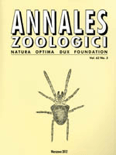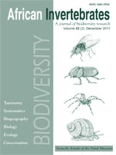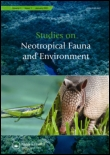
NOVITATES CARIBAEA
metrics 2024
Unveiling the Secrets of Caribbean Ecosystems
Introduction
NOVITATES CARIBAEA is a distinguished academic journal dedicated to the exploration of Caribbean natural history, fostering a deep understanding of the region's biodiversity and ecological significance. Published by the MUSEO NACIONAL HISTORIA NATURAL-SANTO DOMINGO, this open-access journal has been a platform for scholarly communication since 2009, aiming to provide unrestricted access to high-quality research outputs. With its commitment to promoting research in Caribbean ecosystems, NOVITATES CARIBAEA plays a crucial role in the academic community, facilitating knowledge exchange among researchers, professionals, and students. The journal welcomes submissions exploring various aspects of natural history, including taxonomy, conservation biology, and ecological studies, making it an essential resource for those dedicated to understanding and preserving the unique environments of the Caribbean.
Metrics 2024
 -
- 0.20
0.20 -
- -
-Metrics History
Rank 2024
IF (Web Of Science)
JCI (Web Of Science)
Quartile History
Similar Journals

CARIBBEAN JOURNAL OF SCIENCE
Fostering collaboration and knowledge in Caribbean science.Caribbean Journal of Science, published by the University of Puerto Rico, serves as a crucial platform for disseminating innovative research in the field of science across the Caribbean region. With an ISSN of 0008-6452, this journal captures the essence of multidisciplinary studies, ranking 47 out of 111 in its category, showcasing a 58th percentile within Scopus. Although it doesn't currently offer Open Access, it has extended its academic reach since its inception in 1980, fostering collaboration and knowledge growth among researchers, professionals, and students alike. The journal covers an expansive range of scientific disciplines and continues to be a vital resource for those seeking to engage with and contribute to the scientific landscape of the Caribbean. For anyone dedicated to advancing scientific inquiry and practice in this vibrant region, the Caribbean Journal of Science represents an invaluable asset.

Revista de Sociedad Gaditana de Historia Natural
Advancing Knowledge for a Sustainable FutureRevista de Sociedad Gaditana de Historia Natural, published by the SOC GADITANA HISTORIA NATURAL, stands as a pivotal journal in the realm of natural history and environmental sciences. With the ISSN 1577-2578 and E-ISSN 2340-5759, this publication seeks to advance the understanding of biodiversity and ecosystems, particularly within the biodiverse regions of Cádiz, Spain. The journal fosters an open dialogue among researchers, professionals, and students, providing a platform for the dissemination of empirical findings, reviews, and theoretical discussions related to natural history. Although it operates under a non-open-access model, it is anticipated that the journal will play a crucial role in enhancing environmental awareness and promoting conservation efforts through high-quality scholarly contributions. The importance of documenting and understanding the intricate relationships within our ecosystems cannot be overstated, making this journal a valuable resource for anyone passionate about the natural world.

GULF AND CARIBBEAN RESEARCH
Diving into the Future of OceanographyGulf and Caribbean Research is an esteemed academic journal published by the University of Southern Mississippi, dedicated to advancing the understanding of aquatic ecosystems in the Gulf of Mexico and the Caribbean region. With an ISSN of 1528-0470 and an E-ISSN of 2572-1410, the journal serves as an essential platform for researchers and professionals in the fields of Aquatic Science, Oceanography, and Water Science and Technology, recognized in the 2023 Q3 Quartile rankings across these disciplines. The journal welcomes diverse contributions including original research, reviews, and technical notes, encouraging interdisciplinary approaches to address ecological and environmental challenges within its scope. Despite the absence of an open access option, it provides invaluable insights, evidenced by its Scopus rankings, which position it within the 31st to 33rd percentile across various related categories. The engaging research articulated in Gulf and Caribbean Research fosters dialogue and collaboration, making it a vital resource for those committed to scientific discovery and conservation efforts in these critical aquatic environments.

BIOTA NEOTROPICA
Championing Open Access to Ecological KnowledgeBIOTA NEOTROPICA is a prominent open access journal dedicated to advancing knowledge in the interdisciplinary field of ecology, evolution, behavior, and systematics. Published by REVISTA BIOTA NEOTROPICA since 2001, this Brazilian journal aims to provide a platform for high-quality research that fosters a deeper understanding of Neotropical biodiversity and its conservation. With an ISSN of 1676-0603 and an E-ISSN of 1676-0611, the journal has established its reputation within academic circles, ranking in the Q3 quartile for Ecology and achieving a respectable percentile of 57 in Scopus’s metrics. Operating from its headquarters in Campinas, SP, Brazil, BIOTA NEOTROPICA not only focuses on research dissemination but also encourages collaboration and exchange of ideas among scientists, students, and professionals in the field. The journal is particularly valuable for those looking to contribute to the understanding of ecological systems and promotes accessibility with its open access model.

REVISTA CHILENA DE HISTORIA NATURAL
Empowering Ecological Research for TomorrowREVISTA CHILENA DE HISTORIA NATURAL, published by the SOCIETAD BIOLOGIA CHILE, is an esteemed open-access journal dedicated to the fields of Agricultural and Biological Sciences as well as Environmental Science. With an ISSN of 0716-078X and an E-ISSN of 0717-6317, the journal has maintained an impactful presence since its inception in 2000, offering unrestricted access to vital research that influences the biodiversity and ecological initiatives in the region and beyond. Positioned in the Q2 quartile for Agricultural and Biological Sciences and Q3 for Environmental Science as of 2023, REVISTA CHILENA DE HISTORIA NATURAL exemplifies its commitment to high-quality and influential research, evidenced by its respectable ranking in Scopus—89th percentile for Agricultural and Biological Sciences and 131st in Environmental Science. Operated out of Santiago, Chile, and covering a wide range of topics with a converging publication timeline from 2002 to 2024, this journal serves as a crucial resource for researchers, professionals, and students looking to deepen their understanding of natural history and its implications for future ecological preservation.

Marine Biodiversity
Elevating Understanding of Oceanic DynamicsMarine Biodiversity, published by SPRINGER HEIDELBERG, stands as a pivotal journal in the fields of Aquatic Science, Ecology, Evolution, Behavior and Systematics, and Oceanography. Established in 2009, it has gained a prominent place in academic discourse, evidenced by its Q2 ranking across multiple categories in the latest 2023 assessments. The journal operates out of Germany, specifically from its Heidelberg address, and caters to an international audience with a keen interest in the vast and complex dynamics of marine ecosystems. With an ongoing convergence of research outputs until 2024, Marine Biodiversity encourages contributions that expand our comprehension of marine life and its conservation, positioning itself as a vital resource for researchers, professionals, and students alike. Although currently not an open access journal, it maintains a robust reputation backed by its favorable Scopus ranks, which indicate its significant contribution to the respective fields. By disseminating high-quality, peer-reviewed articles, Marine Biodiversity plays an essential role in promoting scholarly communication and advancement in marine science.

ANNALES ZOOLOGICI
Delving into the Dynamics of Animal BiologyANNALES ZOOLOGICI is a distinguished academic journal published by the Museum & Institute of Zoology, Polish Academy of Sciences, based in Warsaw, Poland. With a long-standing tradition in zoological research, this journal has evolved to encompass a diverse range of studies in ecology, evolution, behavior, and systematics, aiming to foster a deeper understanding of animal biology and conservation. It holds a commendable Q2 classification in the 2023 Ecology, Evolution, Behavior and Systematics category, indicating its significant contribution to the field. Although ANNALES ZOOLOGICI is not an open-access publication, it remains accessible to a global audience of researchers, professionals, and students aiming to advance their knowledge and engage with cutting-edge zoological findings. As of 2024, this journal continues to be a vital resource for those eager to explore the complexities of animal life and contribute to ongoing discussions within this essential scientific discipline.

TAIWANIA
Advancing ecological knowledge, one discovery at a time.TAIWANIA is a prestigious and long-standing journal dedicated to the fields of ecology, evolution, and systematics, published by NATIONAL TAIWAN UNIVERSITY PRESS. Since its inception in 1947, this open-access journal has provided a vital platform for researchers to disseminate their findings, encouraging collaboration and innovation in the ecological sciences. With a 2023 impact factor placing it in Quartile 2 for Ecology and Quartile 3 for Ecology, Evolution, Behavior and Systematics, TAIWANIA is recognized for its quality and influence, ranking #267 out of 461 in Environmental Science and #426 out of 721 in Agricultural and Biological Sciences within Scopus. The journal currently publishes contributions from both local and international researchers, showcasing a diverse array of topics that address crucial ecological issues and facilitate the advancement of knowledge in the discipline. For those seeking rigorous research, engaging reviews, and a commitment to open access, TAIWANIA remains a significant resource for the global scientific community.

AFRICAN INVERTEBRATES
Bridging Disciplines in African Invertebrate StudiesAFRICAN INVERTEBRATES is a distinguished open-access academic journal published by the COUNCIL NATAL MUSEUM, specializing in the study of invertebrate biology within the vibrant ecosystems of Africa. Operating since 2006, this journal has established itself as a vital resource in the fields of Animal Science, Ecology, Evolution, Behavior, Insect Science, and Paleontology, earning a strong Q2 ranking in these categories as of 2023. With its ISSN 1681-5556 and E-ISSN 2305-2562, the journal provides unrestricted access to cutting-edge research, fostering collaboration among global researchers and professionals. AFRICAN INVERTEBRATES serves not only as a platform for high-quality scholarly articles but also aims to enhance the understanding of Africa's unique invertebrate fauna and the ecological challenges they face. With a commitment to innovation and excellence, the journal is pivotal for those looking to contribute to the discourse surrounding African biodiversity and conservation strategies.

STUDIES ON NEOTROPICAL FAUNA AND ENVIRONMENT
Illuminating the Path to Conservation in the TropicsSTUDIES ON NEOTROPICAL FAUNA AND ENVIRONMENT is a distinguished academic journal published by Taylor & Francis Ltd, dedicated to advancing the fields of Animal Science, Zoology, and Ecology. With an ISSN of 0165-0521 and an E-ISSN of 1744-5140, this journal has been a significant outlet for scholarly research since its inception in 1976, continuing to provide critical insights into neotropical biodiversity and the environmental intricacies of this rich ecological region through 2024. Recognized in the Q3 category for both Animal Science and Ecology, the journal ranks at #232/490 in Animal Science and Zoology and #402/721 in Ecology, marking it as a valuable resource for researchers, professionals, and students interested in ecological and zoological studies. By offering a platform for innovative research and comprehensive reviews, the journal aims to bridge the gap between theory and practical application, facilitating a deeper understanding of the unique challenges and conservation strategies relevant to neotropical ecosystems. Although not an open-access journal, it plays a crucial role in fostering academic discourse and knowledge dissemination in its field, ensuring that critical advancements in understanding neotropical fauna and environmental dynamics reach a diverse and engaged audience.